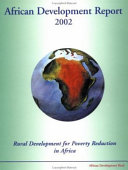
African Development Report 2002
By - African Development Bank
Floor
-
Floor 1
ISBN 10 - 0199253846
ISBN 13 - 9780199253845
Book Status
-
2 Qnty Available with us.
Shelf No
-
17
Call Number
-
338.96 AFR
Physical Description
-
ix, 253 pages : illustrations ; 24 cm